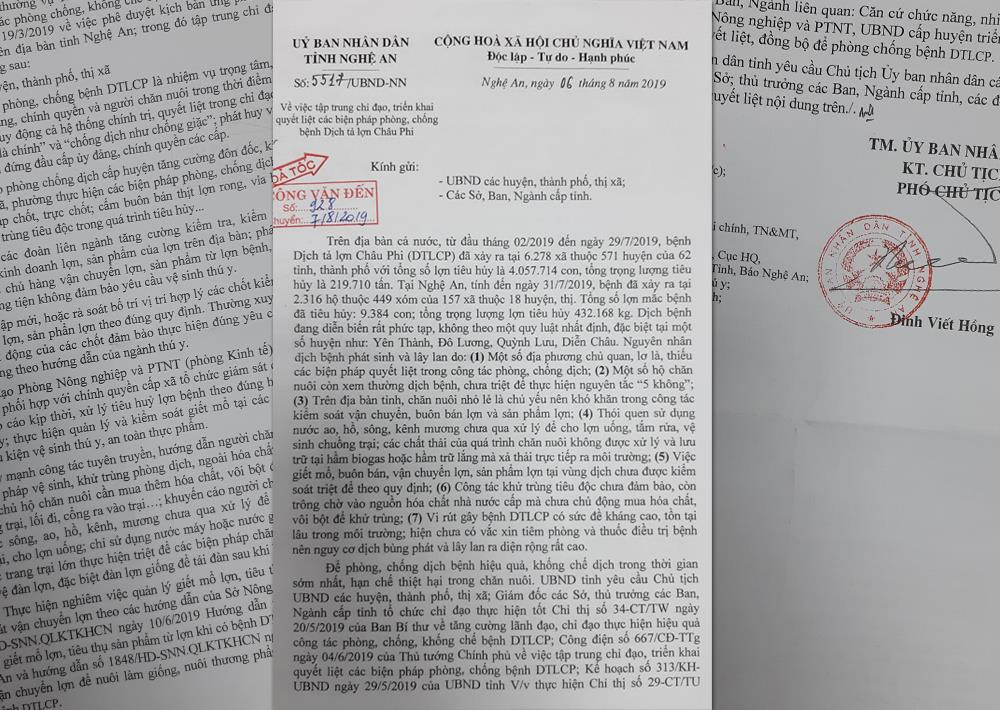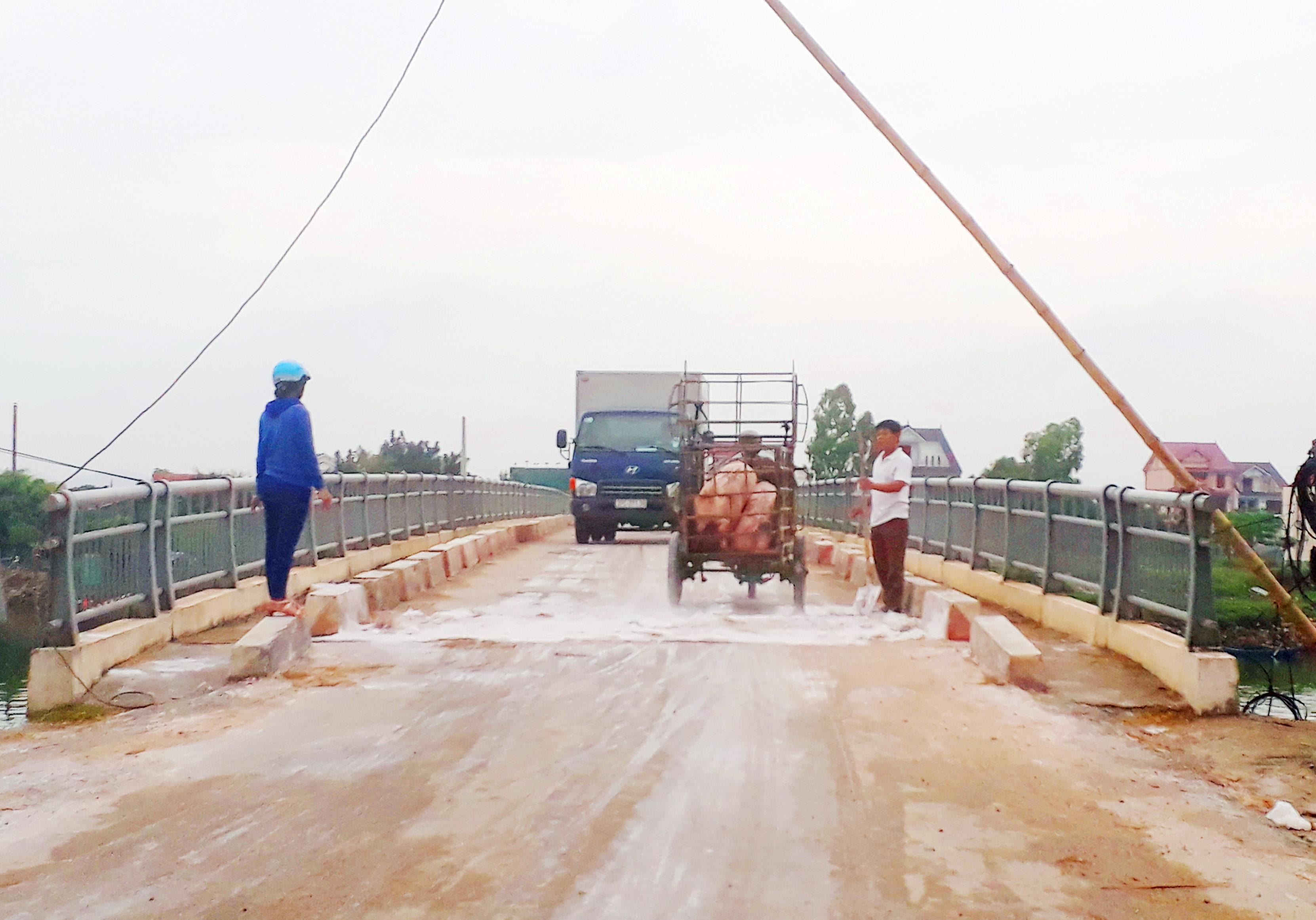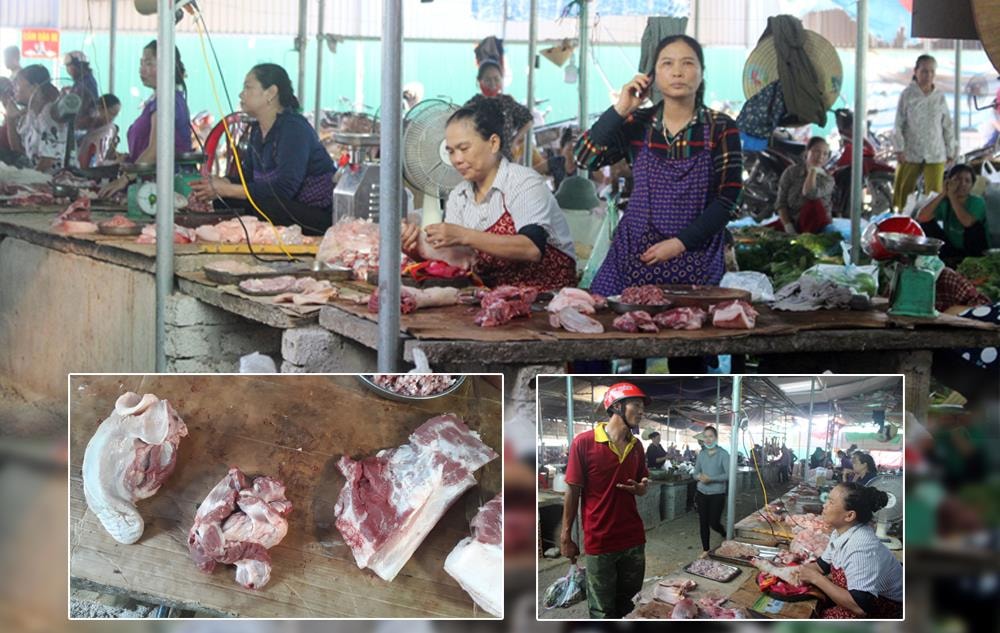Continue to drastically implement measures to prevent and control African swine fever
(Baonghean.vn) - Vice Chairman of the Provincial People's Committee Dinh Viet Hong has just signed a document requesting districts, cities, towns, provincial departments, branches and sectors to focus on directing and drastically implementing measures to prevent and control African swine fever.
There is still a state of negligence and subjectivity.
In the province, up to now, African swine fever has occurred in 2,494 households, 471 hamlets, 159 communes, and 18 districts. The total number of pigs culled is 10,436 (accounting for more than 1% of the province's total pig herd), with a total weight of 480,640 kg.
The epidemic is evolving very complicatedly, not following a certain rule, especially in some districts such as Yen Thanh, Do Luong, Quynh Luu, Dien Chau.
 |
| Many unmanned quarantine checkpoints have occurred in some localities recently. Photo: Document |
The causes of the outbreak and spread of the epidemic are: Some localities are subjective, negligent, and lack drastic measures in disease prevention and control; Some livestock farming households still underestimate the epidemic and have not thoroughly implemented the "5 no" principle;
In the province, small-scale livestock farming is the main activity, making it difficult to control the transportation and trade of pigs and pork products; the habit of using untreated water from ponds, lakes, rivers, and canals for pigs to drink, bathe, and clean their barns; waste from the livestock farming process is not treated and stored in biogas tanks or settling tanks but is discharged directly into the environment;
The slaughter, trade, and transportation of pigs and pig products in epidemic areas have not been thoroughly controlled according to regulations; Disinfection work has not been guaranteed, still relying on the State's chemical source without proactively purchasing chemicals and lime powder for disinfection; The virus causing ASF has high resistance, can survive for a long time in the environment; there is currently no vaccine or medicine to treat the disease, so the risk of the epidemic breaking out and spreading widely is very high.
 |
| Text content. |
Focus on directing drastic measures to prevent and control the epidemic
In that situation, the Provincial People's Committee requested the People's Committees of districts, cities and towns to consider the task of preventing and controlling ASF as a key and urgent task of Party committees, authorities and livestock farmers at present and in the coming time. Mobilize the entire political system, be resolute in direction, with the motto "prevention is the main thing" and "fighting the epidemic like fighting the enemy"; promote the role and responsibility of the heads of Party committees and authorities at all levels.
The District Steering Committee for Disease Prevention and Control has increased supervision and inspection of facilities. It has directed communes and wards to implement disease prevention and control measures: monitoring and reporting epidemics; setting up checkpoints and on duty at checkpoints; banning street and sidewalk pork trading; and strengthening disinfection and sterilization during the destruction process...
Direct interdisciplinary teams to strengthen inspection and control of transportation, slaughter, and trading of pigs and pig products in the area; detect and strictly handle owners transporting sick pigs and pig products of unknown origin; and vehicles that do not meet veterinary hygiene requirements.
Establish new or review and arrange suitable locations for checkpoints to control the transportation of pigs and pig products according to regulations. Regularly check and correct the operation of substances to ensure compliance with technical requirements; arrange disinfection pits according to the instructions of the Veterinary sector.
 |
| A modified vehicle transporting pigs into Quynh Phuong ward (Hoang Mai town) was asked to stop by the authorities. Photo: Document |
Direct the Department of Agriculture and Rural Development (Economic Department), the Animal Husbandry and Veterinary Station to coordinate with commune-level authorities to closely monitor, detect early, promptly report, and destroy sick pigs according to the instructions of veterinary agencies; manage and control slaughter at slaughterhouses to ensure veterinary hygiene and food safety conditions.
Strengthen propaganda work, instruct farmers to properly implement hygiene and disinfection measures to prevent epidemics. In addition to chemicals supported by the State, farmers need to buy more chemicals and lime powder to disinfect barns, walkways, and farm gates. Farmers are advised not to use untreated river, pond, lake, canal, or ditch water to bathe pigs, clean barns, or give pigs water to drink; only use tap water or treated well water; large farms thoroughly implement biosecurity measures to protect pig herds, especially breeding pigs, to re-herd after the epidemic is over.
Strictly implement the management of pig slaughter, consumption of pig products, and control of pig transportation according to the instructions of the Department of Agriculture and Rural Development.
 |
| Many localities have not strictly controlled pig slaughter in epidemic areas. Pork for sale does not have a quarantine stamp from veterinary agencies. Photo: Document |
Proactively arrange funding for epidemic prevention and control; provide financial support to the People's Committees of communes, pay reasonable remuneration to the forces participating in epidemic prevention and control... The Chairman of the People's Committee at the district level directly directs the assessment of epidemic prevention and control work, damage caused by ASF and is responsible for the time to complete support documents and destruction data; publicly implement policies and support levels on mass media and in hamlets and communes.
Any locality that is subjective and not resolute in directing the implementation of epidemic prevention and control measures, leading to poor disease surveillance and slow epidemic reporting; negligent in setting up checkpoints, being on duty at checkpoints, and dismantling checkpoints when there is an epidemic in the locality; peddling pork; destroying pigs in violation of regulations... allowing the epidemic to spread widely and become difficult to control, the Chairman of the People's Committee at the district level must be responsible to the Chairman of the Provincial People's Committee...
